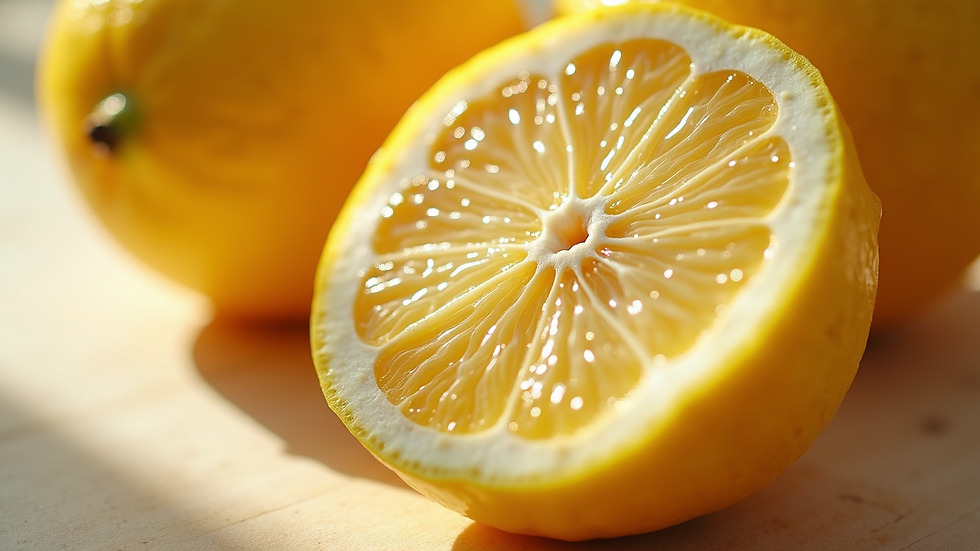Say Goodbye to Chemicals: 7 Surprising Cleaning Alternatives You Need to Try
- Mar 21, 2025
- 3 min read
Cleaning your home doesn’t have to be a battle against harsh chemicals. Many people are unaware of the effective, natural cleaning alternatives that can leave your spaces fresh and safe for your family. As public awareness of health and environmental concerns grows, more households are turning to chemical-free cleaning methods. Here’s a look at seven surprising cleaning alternatives that you will want to try!
1. Vinegar: The Versatile Powerhouse
Vinegar is often hailed as a cleaning superstar, thanks to its acidic properties. It works wonders as a disinfectant and odor neutralizer.
How to Use:
For windows: Combine equal parts water and vinegar in a spray bottle for a streak-free finish on glass surfaces.
For laundry: Add half a cup of vinegar during the rinse cycle. This not only softens clothes but can also reduce odor by up to 30%.

2. Baking Soda: The Gentle Abrasive
Baking soda is a natural cleaner that is both gentle and effective. Its mild abrasiveness means you can clean surfaces without scratching them.
How to Use:
For carpets: Sprinkle baking soda on your carpet and let it sit for around 15 minutes. When you vacuum, you’ll notice a significant reduction in odors.
For surfaces: Mix water with baking soda to create a paste. This paste works wonders on tough stains on sinks, counters, and even inside ovens.
3. Lemon Juice: The Fresh Scent
Lemon juice not only smells great but has powerful antibacterial properties. It can brighten surfaces and freshen your home effortlessly.
How to Use:
For cutting boards: Grab half a lemon, rub it over your cutting board, sprinkle with salt, and let it sit for five minutes before rinsing. This method can reduce bacteria by over 90%.
For bathroom stains: Create a paste with lemon juice and baking soda to tackle stubborn mold and mildew. This combination can remove stains effectively without the use of harsh chemicals.

4. Olive Oil: The Natural Polisher
Did you know that olive oil can be used for cleaning? This kitchen staple can shine up wooden furniture and stainless steel appliances without any harmful effects.
How to Use:
For wood furniture: Mix two parts olive oil with one part vinegar in a spray bottle. This mixture will rejuvenate wooden surfaces while adding a protective layer.
For stainless steel: Use a small amount of olive oil on a microfiber cloth to buff your appliances, effectively removing fingerprints and smudges.
5. Essential Oils: Aromatic Cleaning
Essential oils not only add pleasant scents but also possess unique cleaning properties. Oils such as tea tree, eucalyptus, and lavender have natural antibacterial and antifungal qualities.
How to Use:
For all-purpose cleaner: Combine equal parts water and vinegar, and add ten drops of your favorite essential oil. This fragrant solution makes a great cleaner for various surfaces.
For air freshening: Place a few drops of essential oil in a bowl of water or on a cotton ball to naturally freshen up any room.

6. Castile Soap: The All-Natural Detergent
Castile soap is made from vegetable oils and is extremely versatile. This plant-based alternative can replace numerous traditional cleaning agents around your home.
How to Use:
For dishes: Mix a few drops of Castile soap with warm water, and you’ll have an effective dishwashing detergent that cuts through grease.
For surfaces: Use it to mop floors, clean countertops, or even as a gentle body wash. It is biodegradable and safe for the environment.
7. Cornstarch: The Unexpected Cleaner
Cornstarch is often overlooked when it comes to cleaning. Its absorbent properties make it an excellent choice for tackling dirt and grime.
How to Use:
For windows: Combine cornstarch with water to create a natural window cleaner that leaves no streaks behind.
For furniture polish: Make a paste from cornstarch, vinegar, and water to polish your wooden furniture, giving it a fresh look.
Final Thoughts
Cleaning your home can be both safe and effective without using strong chemicals. By incorporating natural alternatives like vinegar and baking soda into your routine, you can create a healthier living space.
These surprising alternatives not only clean well but also provide peace of mind, knowing your home is free from harmful substances. Start integrating one or more of these options into your cleaning habits today. Embrace a cleaner, greener way of living for you and your family!






Comments